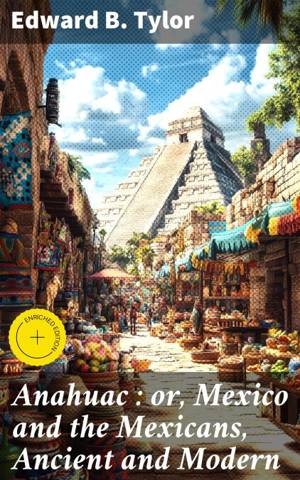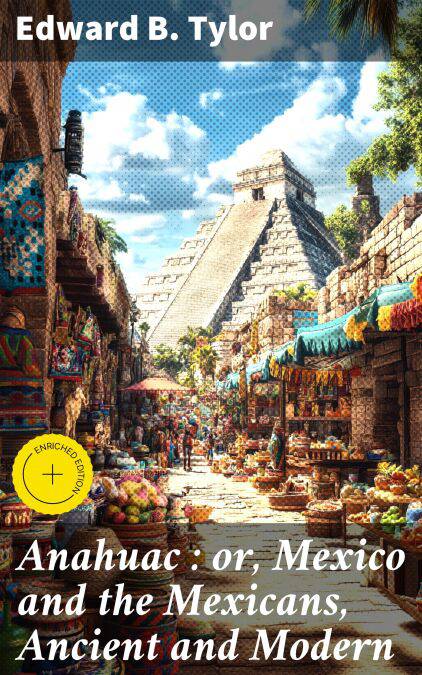
Bedankt voor het vertrouwen het afgelopen jaar! Om jou te bedanken bieden we GRATIS verzending (in België) aan op alles gedurende de hele maand januari.
- Afhalen na 1 uur in een winkel met voorraad
- In januari gratis thuislevering in België
- Ruim aanbod met 7 miljoen producten
Bedankt voor het vertrouwen het afgelopen jaar! Om jou te bedanken bieden we GRATIS verzending (in België) aan op alles gedurende de hele maand januari.
- Afhalen na 1 uur in een winkel met voorraad
- In januari gratis thuislevering in België
- Ruim aanbod met 7 miljoen producten
Zoeken
Anahuac : or, Mexico and the Mexicans, Ancient and Modern E-BOOK
Enriched edition. Exploring Mexico's Ancient Civilizations and Modern Society
Edward B. Tylor
E-book | Engels
€ 0,49
Omschrijving
In "Anahuac: or, Mexico and the Mexicans, Ancient and Modern," Edward B. Tylor presents a pioneering exploration of Mexican history, culture, and anthropology. This seminal work intricately weaves together a rich tapestry of indigenous traditions and contemporary practices, while showcasing Tylor's keen observational prowess and analytical rigor. Through a blend of ethnographic detail and historical narratives, Tylor positions Mexico as a crucial intersection of ancient civilizations and modernity, reflecting the broader intellectual currents of the late 19th century that sought to understand the nuanced dynamics of cultural evolution across civilizations. Edward B. Tylor, widely acclaimed as one of the founding figures in anthropology, was heavily influenced by his extensive travels and studies in various cultures. His experiences served to sharpen his focus on the intricacies of human societies and their developmental trajectories. Tylor's commitment to a science of culture, evident throughout his career, finds profound expression in "Anahuac" as he meticulously documents the interplay between Mexicans' historical legacies and their contemporary identity, thus breaking new ground in cross-cultural analysis. This book is a vital read for anyone interested in anthropology, history, or the rich cultural heritage of Mexico. Tylor's insights remain relevant today, making it essential for scholars and general readers alike who seek to grasp the complex narratives that shape societal identities. Dive into Tylor's engaging prose and deepen your understanding of Mexico's past and present.
In this enriched edition, we have carefully created added value for your reading experience:
- A succinct Introduction situates the work's timeless appeal and themes.
- The Synopsis outlines the central plot, highlighting key developments without spoiling critical twists.
- A detailed Historical Context immerses you in the era's events and influences that shaped the writing.
- An Author Biography reveals milestones in the author's life, illuminating the personal insights behind the text.
- A thorough Analysis dissects symbols, motifs, and character arcs to unearth underlying meanings.
- Reflection questions prompt you to engage personally with the work's messages, connecting them to modern life.
- Hand‐picked Memorable Quotes shine a spotlight on moments of literary brilliance.
- Interactive footnotes clarify unusual references, historical allusions, and archaic phrases for an effortless, more informed read.
In this enriched edition, we have carefully created added value for your reading experience:
- A succinct Introduction situates the work's timeless appeal and themes.
- The Synopsis outlines the central plot, highlighting key developments without spoiling critical twists.
- A detailed Historical Context immerses you in the era's events and influences that shaped the writing.
- An Author Biography reveals milestones in the author's life, illuminating the personal insights behind the text.
- A thorough Analysis dissects symbols, motifs, and character arcs to unearth underlying meanings.
- Reflection questions prompt you to engage personally with the work's messages, connecting them to modern life.
- Hand‐picked Memorable Quotes shine a spotlight on moments of literary brilliance.
- Interactive footnotes clarify unusual references, historical allusions, and archaic phrases for an effortless, more informed read.
Specificaties
Betrokkenen
- Auteur(s):
- Uitgeverij:
Inhoud
- Aantal bladzijden:
- 340
- Taal:
- Engels
Eigenschappen
- Productcode (EAN):
- 4064066228590
- Verschijningsdatum:
- 10/12/2019
- Uitvoering:
- E-book
- Beveiligd met:
- Digital watermarking
- Formaat:
- ePub

Alleen bij Standaard Boekhandel
Beoordelingen
We publiceren alleen reviews die voldoen aan de voorwaarden voor reviews. Bekijk onze voorwaarden voor reviews.









